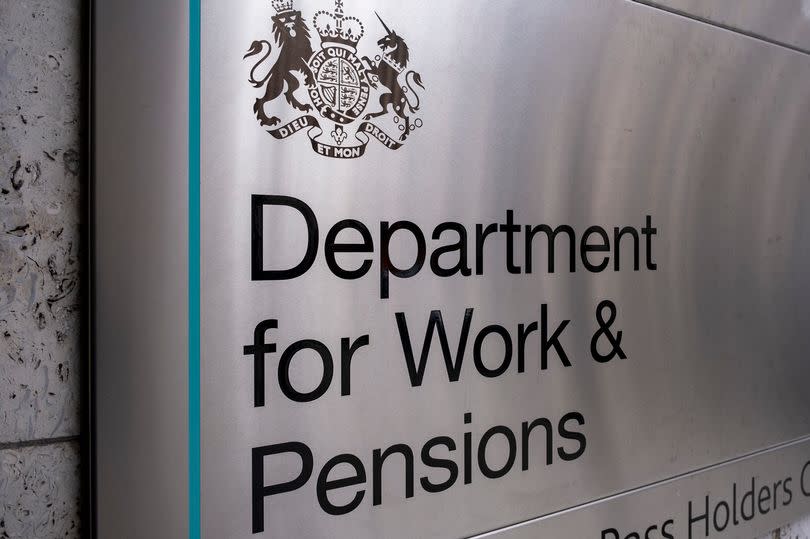DWP to get new powers to make arrests and seize money from benefit fraudsters

The government is set to bolster the Department for Work and Pensions (DWP) with new powers to combat benefit fraud, akin to those held by HM Revenue and Customs (HMRC). The forthcoming Fraud Bill, as confirmed by Prime Minister Rishi Sunak, will empower DWP investigators with the authority to execute warrants, make arrests, seize items, and impose civil penalties on a broader range of individuals.
This move comes in addition to the capabilities being introduced through the Data Protection and Digital Information Bill, which allows the DWP to obtain information from third parties, including banks. On Friday, Prime Minister Rishi Sunak unveiled these additional measures, emphasising the need to prevent fraudsters from taking advantage of the UK's spirit of compassion and generosity.
The PM declared: "We cannot allow fraudsters to exploit the natural compassion and generosity of the British people." He added: "We've already cracked down on thousands of people wrongly claiming Universal Credit, including those not reporting self-employed earnings or hiding capital and we'll save the taxpayer £600 million by legislating to access vital data from third parties like banks.", reports the Daily Record.
READ MORE: 'Desperate' mum and daughter, 10, trapped in flat so small they have to eat on bed

Sunak also highlighted the role of modern technology, such as Artificial Intelligence, in enhancing the welfare system's integrity: "We're using all the developments in modern technology, including Artificial Intelligence to crack down on exploitation in the welfare system that's taking advantage of the hardworking taxpayers who fund it."
"We're preparing a new Fraud Bill for the next Parliament which will align DWP with HMRC so we treat benefit fraud like tax fraud with new powers to make seizures and arrests."
The PM added: "We'll also enable penalties to be applied to a wider set of fraudsters through a new civil penalty. Because when people see others in their community gaming the system that their taxes pay, it erodes support for the very principle of the welfare state."
The UK Government has described this move as one of the most significant overhauls of benefit fraud legislation in more than two decades, projecting taxpayer savings of £600 million by the fiscal year 2028/29.
Additionally, the Government's plan aims to create a welfare system that is "fit for the future by providing vital support only to those who need it most, ensuring they are supported to live with dignity and independence, whilst making sure that everyone who can work is expected and supported to do so".
Regarding bank account monitoring for fraud, the current regulations permit the DWP to request details of banking transactions from account holders on an individual basis when there is reasonable suspicion of fraud.
However, the Data Protection and Digital Information Bill could grant new powers to the DWP, allowing them to access the personal data of benefit claimants. This would require third parties, such as banks or building societies, to conduct mass monitoring without suspicion of fraudulent activity - a topic that has sparked much parliamentary debate since its announcement last year.
An online petition, created by Wendy Scott and signed by over 24,100 people, argues that "most benefit claimants are not fraudsters". It labels the proposed new approach to accessing bank accounts as "too aggressive an approach towards benefit claimants".
In response to the petition on February 5, the DWP stated: "We must modernise and strengthen DWPs legislative framework to give those fighting fraud the tools they need to stand up to future challenges and minimise the impact of genuine mistakes that can lead to debt."

"The third-party data gathering measure enables DWP to request data from third parties so we can more proactively detect fraud and error in the welfare system."
The DWP further explained how "data is a powerful tool to understand whether someone is entitled to benefit", adding that it already utilises "several data streams to help verify a person's claim or entitlement to benefit which has helped significantly reduce other types of fraud and error".
The Department for Work and Pensions (DWP) has defended a new measure aimed at preventing benefit fraud, stating: "This measure will provide better access to data to establish whether someone is entitled to benefit, making it harder for fraudsters to steal from the taxpayer. The measure will also address error by ensuring claimants are in receipt of the correct amount of benefit that they are entitled, preventing people from inadvertently getting into debt."
They further clarified misconceptions, saying: "There are a number of misconceptions about this measure, namely, it does not grant DWP access to any bank accounts and it does not allow DWP to see how claimants are spending their money."
The DWP elaborated that the process involves third parties examining their own data to supply "relevant information" to the department that "may signal where claimants do not meet the eligibility criteria for the benefit they are receiving".
"DWP will only receive data on accounts matching criteria DWP prescribes, these will be linked to eligibility criteria for benefits that, if met, may require further consideration to ensure a claim is correct through our business-as-usual processes," the DWP explained.
The complete response from the DWP can be accessed on the petitions-parliament website. Should the petition titled 'Do not introduce regular bank account checks for benefit claimants' reach 100,000 signatures, it would trigger a consideration by the Petitions Committee for a potential debate in Parliament by MPs.
Want more from MyLondon? Sign up to our daily newsletters for all the latest and greatest from across London here.

 Yahoo News
Yahoo News 
